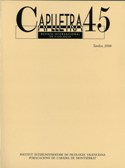La recerca sobre el factor edat en llengües estrangeres no és independentista
DOI:
https://doi.org/10.7203/caplletra.45.4793Keywords:
learning of second languages, relationships between age and linguistic learning, learning of languages in school contexts, learning of English Abstract
Abstract
In order to guarantee better results in the acquisition of foreign languages, there is a generalized trend all over the world which states that the learning of a foreign language should be done as early as possible.
This article aims at exploring several questions related to this subject: (1) To discuss the origin of expectations of linguistic policies which imply that “regarding languages, the earlier the better”; (2) the reason for the differences in the results obtained in studies with apprentices in natural contexts and in contexts of foreign language learning; and finally (3) to show the results of the research on the learning of English by Catalan students, in writing in particular, carried out in the Acquisition Research Group of Second Languages(GRAL) at the University of Barcelona.
 Downloads
Downloads
Downloads
Published
How to Cite
-
Abstract415
-
PDF (Català)127
Issue
Section
License
Authors submitting work to Caplletra for publication must be the legitimate holder of the usage rights. Legitimacy for the purposes of publishing the work must also include images, tables, diagrams and any other materials that may complement the text, whether they are the author of such material or not.
Copyright: on publishing their work in the journal, the author grants Caplletra. Revista Internacional de Filologia usage rights (reproduction, distribution and public communication) for both the paper printed version and for the electronic version.
All work published in Caplletra is covered by the Creative Commons license type Attribution-NonCommercial-NoDerivatives 4.0 (CC BY-NC-ND 4.0).
RESPONSABILITY
Caplletra. Revista Internacional de Filologia does not necessarily identify with the points of view expressed in the papers it publishes.
Caplletra. Revista Internacional de Filologia accepts no responsibility whatsoever for any eventual infringement of intellectual property rights on the part of authors.






